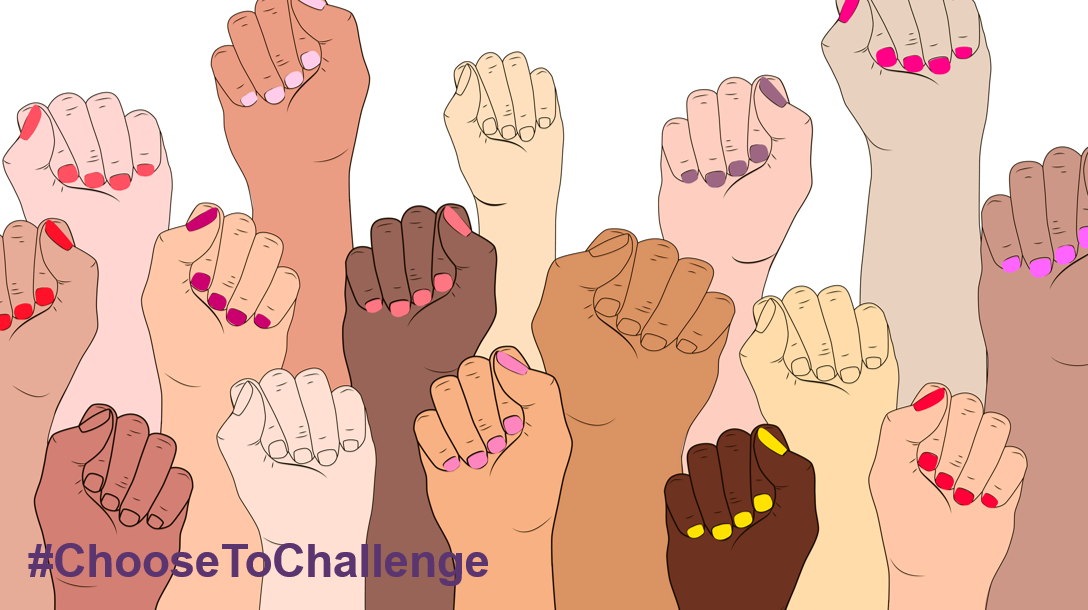International Women’s Day – How will you Choose To Challenge?
To Challenge or Not to Challenge?
For some of us the last year has been a time for rethinking. It’s opened more honest conversations about a lot of things that could be done better, whether at home or at work, in society or in our communities. We’re in the mood to challenge and change things.
For others, the International Women’s Day hashtag #ChooseToChallenge will get the reaction: ‘Really? Isn’t #JustAboutGettingBy quite enough for now?’
A simple recipe for IWD?
Whichever camp we’re in, and whatever our gender identity, International Women’s Day will be all around on 8th March and it offers a chance to respond. So, here’s a thought: something extremely simple and yet at the same time profound. A bit of an upside-down challenge, perhaps, given the day’s theme. How about seeing beyond gender for a day (at least).
After you, Sir or Madam
Many of us will think we do this already; and kudos if you consistently do. If you’re non-binary or have lots of trans+ friends, then you’ll be pretty adept. But have you ever felt affronted by a curt email from a female colleague, that would have read as simply straightforward from a male colleague? No? Great. Most of us do pretty well at this one in the workplace these days.
However, do we treat all the people we encounter outside of work in the same way too? It can be much harder with relatives, or with the public in general, not to pick up on gender. If you wave someone with a small basket ahead while you unload your heaped weekly trolley at the supermarket checkout, do you hesitate and wonder whether it’s more polite to say ‘I’ll let this lady (or woman?) go first’?
Or might you simply say ‘I’ll let this person go first’? We would not, after all, feel the urge to say ‘I’ll let this white person go ahead’ or ‘Please serve this Muslim first’ or ‘This older person should go in front’. It would clearly be preposterous to call out information such as skin colour, religion or age when they have nothing to do with the task in hand. And yet, gender often gets through the net as a label, doesn’t it? Why?
Further still, do we ever use gender as if it’s vaguely part of the praise or insult when we’re describing someone: ‘she’s a difficult woman’, ‘she’s a feisty lady’, ‘he’s a vary caring man’, ‘he’s quite an aggressive bloke’. What’s going on there when we do?
And does it then have a chance of showing up at work when promotion and career progression choices, and biases, culminate in gender pay gaps?
Nice motor
Sometimes gender assumptions stick even as we think we’re challenging them. I’m the main breadwinner in our household. The other three members are male, and very much into cars. When we changed cars recently I wanted to make an environmental commitment and go electric. I persuaded them to that way of thinking with good, wholesome reasons: an achievement, with petrol heads.
And then the environment-friendly vehicle I bought (well, I’m still paying) was a Jaguar I-Pace, in black, with red seats. It can’t half accelerate, and everyone was delighted. My dad did make a comment about it being an expensive option among EVs. I laughed: ‘It’s worth it, Dad: it’s a feminist statement’. It was part of an ongoing, jokey conversation I have with my father about gender stereotypes.
But maybe Dad was right about my return on investment. Even allowing for my small-town / village setting, I’ve been slightly surprised by the number of people who’ve told me: ‘I like your husband’s new car!’
Starting early
The Fawcett Society Commission on Gender Stereotypes in Early Childhood got to the heart of it. The report has very practical recommendations for action for three groups: for the commercial sector producing clothes, toys, books, media for children; for early years educators and practitioners; and for parents. Essentially, if we’re not bound in at the outset by clothes that presume either pink prettiness or blue bravery then we all have much more freedom to be who we are.
I loved being part of that Commission, and also joining our internal Knowledge Community recently looking at the same topic, applied to our nursery settings. As Caroline Wright, Bright Horizons’ Early Childhood Director commented: ‘Our teachers are very mindful not to label children as ‘boys’ or ‘girls’ whenever possible; referring instead to ‘friends’ or ‘children’… teachers in our nurseries are very careful not to group children together according to gender.’
Choose to Challenge
We may not all have been lucky enough to avoid gendered assumptions at school, or at home. Did the expectations held of us early in life lead us into gendered roles, including at home recently during lockdown? Or have we challenged them?
Whether gender for you is a strong part of your identity that you want to celebrate – or whether you’d rather be free from expectations imposed on you by it – maybe we can call out some of the less helpful assumptions this International Women’s Day, and beyond.



